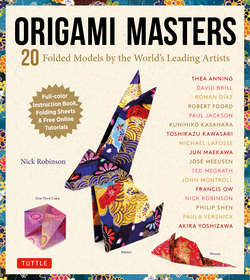Читать книгу Origami Masters Ebook - Nick Robinson - Страница 4
На сайте Литреса книга снята с продажи.
ОглавлениеINTRODUCTION
The Japanese word origami—composed of ORI, “to fold,” and KAMI, “paper”—literally means “to fold paper” (or “folded paper”). It alludes to the possibility of using one or more sheets of paper to create a folded paper representation of a given subject. With the art of origami you can reproduce practically anything, whether it belongs to the realm of the abstract or instead involves a form of figurative representation, be it a living form, an inanimate object or a machine: there are no limits to creativity!
This collection—curated by internationally renowned origamist Nick Robinson—presents a selection of twenty impressive models from all over the world, created by some of the most important contemporary origami masters. As with all original works of art, these pieces vary greatly in style and form, as each embodies an original vision of origami and depicts each particular subject as it is interpreted by the individual artist: from the charming Two-Fold Santa to classic animals such as the Smiling Frog and the Penguin, and from organic forms to geometric shapes, each subject is developed based on the very personal interpretation of its creator.
To create these models, it is essential to read the instructions carefully before starting. Do your best to envision the process in advance, step by step. Whenever you approach one of the models in this book for the first time, it is advisable to fold it using regular origami paper: you should use this kit’s special paper only when you are able to fold it to perfection. Indeed, once you have learned the folds of a model, it is fun to experiment, for instance using new types of paper to determine which color, pattern or texture work best. Then, start to fold again from the beginning with your favorite paper. Work slowly and with great precision, starting over with a fresh sheet if you make a mistake. Depending on the skill level and experience of the individual folder, it is normal to find oneself having to perform the same sequence several times before mastering it to the point of making the model really satisfying and expressive. But the effort will be well repaid by the variety and originality of the ideas provided in this book.
Once the model is mastered, you can start looking for faster folding procedures for the models presented here, which are designed for beginners and require several additional steps that an expert folder could ignore.
Once you have a good understanding of the models, it will be fun to experiment. Get creative by changing angles and folds to give your models a touch of originality. Don’t worry about the challenge represented by the projects collected in these pages: the book also contains a very useful introductory section that contains all the symbols and terminology to help even the absolute beginner to quickly learn the language of origami.
Have fun experimenting, reduce or enlarge the models according to your taste and if you manage to create new models… well, share them with me: you may be published in my next collection!
